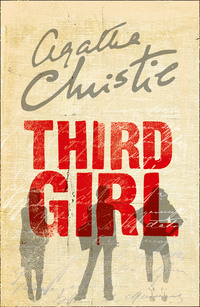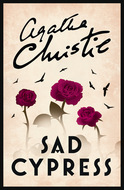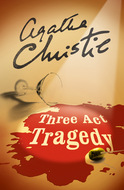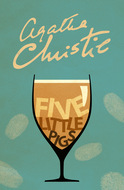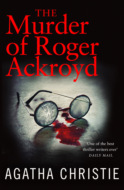Kitap dosya olarak indirilemez ancak uygulamamız üzerinden veya online olarak web sitemizden okunabilir.
Kitabı oku: «Third Girl»

Third Girl

Published by HarperCollinsPublishers Ltd
1 London Bridge Street
London SE1 9GF
First published in Great Britain by
Collins 1966
Agatha Christie® Poirot® Third Girl™
Copyright © 1966 Agatha Christie Limited. All rights reserved.
Cover design © HarperCollinsPublishers Ltd 2015
Title lettering by Ghost Design
Cover photograph © Morgan Norman/Gallery Stock
Agatha Christie asserts the moral right to be identified as the author of this work.
A catalogue copy of this book is available from the British Library.
This novel is entirely a work of fiction. The names, characters and incidents portrayed in it are the work of the author’s imagination. Any resemblance to actual persons, living or dead, events or localities is entirely coincidental.
All rights reserved under International and Pan-American Copyright Conventions. By payment of the required fees, you have been granted the non-exclusive, non-transferable right to access and read the text of this e-book on screen. No part of this text may be reproduced, transmitted, down-loaded, decompiled, reverse engineered, or stored in or introduced into any information storage and retrieval system, in any form or by any means, whether electronic or mechanical, now known or hereinafter invented, without the express written permission of HarperCollins.
Source ISBN: 9780008129606
Ebook Edition © September 2015 ISBN: 9780007422869
Version: 2017-04-13
To Nora Blackborow
Contents
Cover
Title Page
Copyright
Dedication
CHAPTER 1
CHAPTER 2
CHAPTER 3
CHAPTER 4
CHAPTER 5
CHAPTER 6
CHAPTER 7
CHAPTER 8
CHAPTER 9
CHAPTER 10
CHAPTER 11
CHAPTER 12
CHAPTER 13
CHAPTER 14
CHAPTER 15
CHAPTER 16
CHAPTER 17
CHAPTER 18
CHAPTER 19
CHAPTER 20
CHAPTER 21
CHAPTER 22
CHAPTER 23
CHAPTER 24
CHAPTER 25
Also by Agatha Christie
About the Publisher
CHAPTER 1
Hercule Poirot was sitting at the breakfast table. At his right hand was a steaming cup of chocolate. He had always had a sweet tooth. To accompany the chocolate was a brioche. It went agreeably with chocolate. He nodded his approval. This was from the fourth shop he had tried. It was a Danish pâtisserie but infinitely superior to the so-called French one nearby. That had been nothing less than a fraud.
He was satisfied gastronomically. His stomach was at peace. His mind also was at peace, perhaps somewhat too much so. He had finished his Magnum Opus, an analysis of great writers of detective fiction. He had dared to speak scathingly of Edgar Allan Poe, he had complained of the lack of method or order in the romantic outpourings of Wilkie Collins, had lauded to the skies two American authors who were practically unknown, and had in various other ways given honour where honour was due and sternly withheld it where he considered it was not. He had seen the volume through the press, had looked upon the results and, apart from a really incredible number of printer’s errors, pronounced that it was good. He had enjoyed this literary achievement and enjoyed the vast amount of reading he had had to do, had enjoyed snorting with disgust as he flung a book across the floor (though always remembering to rise, pick it up and dispose of it tidily in the waste-paper basket) and had enjoyed appreciatively nodding his head on the rare occasions when such approval was justified.
And now? He had had a pleasant interlude of relaxation, very necessary after his intellectual labour. But one could not relax for ever, one had to go on to the next thing. Unfortunately he had no idea what the next thing might be. Some further literary accomplishment? He thought not. Do a thing well then leave it alone. That was his maxim. The truth of the matter was, he was bored. All this strenuous mental activity in which he had been indulging—there had been too much of it. It had got him into bad habits, it had made him restless…
Vexatious! He shook his head and took another sip of chocolate.
The door opened and his well-trained servant, George, entered. His manner was deferential and slightly apologetic. He coughed and murmured, ‘A—’ he paused, ‘—a—young lady has called.’
Poirot looked at him with surprise and mild distaste.
‘I do not see people at this hour,’ he said reprovingly.
‘No, sir,’ agreed George.
Master and servant looked at each other. Communication was sometimes fraught with difficulties for them. By inflexion or innuendo or a certain choice of words George would signify that there was something that might be elicited if the right question was asked. Poirot considered what the right question in this case might be.
‘She is good-looking, this young lady?’ he inquired carefully.
‘In my view—no, sir, but there is no accounting for tastes.’
Poirot considered his reply. He remembered the slight pause that George had made before the phrase—young lady. George was a delicate social recorder. He had been uncertain of the visitor’s status but had given her the benefit of the doubt.
‘You are of the opinion that she is a young lady rather than, let us say, a young person?’
‘I think so, sir, though it is not always easy to tell nowadays.’ George spoke with genuine regret.
‘Did she give a reason for wishing to see me?’
‘She said—’ George pronounced the words with some reluctance, apologising for them in advance as it were, ‘that she wanted to consult you about a murder she might have committed.’
Hercule Poirot stared. His eyebrows rose. ‘Might have committed? Does she not know?’
‘That is what she said, sir.’
‘Unsatisfactory, but possibly interesting,’ said Poirot.
‘It might—have been a joke, sir,’ said George, dubiously.
‘Anything is possible, I suppose,’ conceded Poirot, ‘but one would hardly think—’ He lifted his cup. ‘Show her in after five minutes.’
‘Yes, sir.’ George withdrew.
Poirot finished the last sip of chocolate. He pushed aside his cup and rose to his feet. He walked to the fireplace and adjusted his moustaches carefully in the mirror over the chimney piece. Satisfied, he returned to his chair and awaited the arrival of his visitor. He did not know exactly what to expect…
He had hoped perhaps for something nearer to his own estimate of female attraction. The outworn phrase ‘beauty in distress’ had occurred to him. He was disappointed when George returned ushering in the visitor; inwardly he shook his head and sighed. Here was no beauty—and no noticeable distress either. Mild perplexity would seem nearer the mark.
‘Pha!’ thought Poirot disgustedly. ‘These girls! Do they not even try to make something of themselves? Well made up, attractively dressed, hair that has been arranged by a good hairdresser, then perhaps she might pass. But now!’
His visitor was a girl of perhaps twenty-odd. Long straggly hair of indeterminate colour strayed over her shoulders. Her eyes, which were large, bore a vacant expression and were of a greenish blue. She wore what were presumably the chosen clothes of her generation. Black high leather boots, white open-work woollen stockings of doubtful cleanliness, a skimpy skirt, and a long and sloppy pullover of heavy wool. Anyone of Poirot’s age and generation would have had only one desire. To drop the girl into a bath as soon as possible. He had often felt this same reaction walking along the streets. There were hundreds of girls looking exactly the same. They all looked dirty. And yet—a contradiction in terms—this one had the look of having been recently drowned and pulled out of a river. Such girls, he reflected, were not perhaps really dirty. They merely took enormous care and pains to look so.
He rose with his usual politeness, shook hands, drew out a chair.
‘You demanded to see me, mademoiselle? Sit down, I pray of you.’
‘Oh,’ said the girl, in a slightly breathless voice. She stared at him.
‘Eh bien?’ said Poirot.
She hesitated. ‘I think I’d—rather stand.’ The large eyes continued to stare doubtfully.
‘As you please.’ Poirot resumed his seat and looked at her. He waited. The girl shuffled her feet. She looked down on them then up again at Poirot.
‘You—you are Hercule Poirot?’
‘Assuredly. In what way can I be of use to you?’
‘Oh, well, it’s rather difficult. I mean—’
Poirot felt that she might need perhaps a little assistance. He said helpfully, ‘My manservant told me that you wanted to consult me because you thought you “might have committed a murder”. Is that correct?’
The girl nodded. ‘That’s right.’
‘Surely that is not a matter that admits of any doubt. You must know yourself whether you have committed a murder or not.’
‘Well, I don’t know quite how to put it. I mean—’
‘Come now,’ said Poirot kindly. ‘Sit down. Relax the muscles. Tell me all about it.’
‘I don’t think—oh dear, I don’t know how to—You see, it’s all so difficult. I’ve—I’ve changed my mind. I don’t want to be rude but—well, I think I’d better go.’
‘Come now. Courage.’
‘No, I can’t. I thought I could come and—and ask you, ask you what I ought to do—but I can’t, you see. It’s all so different from—’
‘From what?’
‘I’m awfully sorry and I really don’t want to be rude, but—’
She breathed an enormous sigh, looked at Poirot, looked away, and suddenly blurted out, ‘You’re too old. Nobody told me you were so old. I really don’t want to be rude but—there it is. You’re too old. I’m really very sorry.’
She turned abruptly and blundered out of the room, rather like a desperate moth in lamplight.
Poirot, his mouth open, heard the bang of the front door.
He ejaculated: ‘Nom d’un nom d’un nom…’
CHAPTER 2
The telephone rang.
Hercule Poirot did not even seem aware of the fact.
It rang with shrill and insistent persistence.
George entered the room and stepped towards it, turning a questioning glance towards Poirot.
Poirot gestured with his hand.
‘Leave it,’ he said.
George obeyed, leaving the room again. The telephone continued to ring. The shrill irritating noise continued. Suddenly it stopped. After a minute or two, however, it commenced to ring again.
‘Ah Sapristi! That must be a woman—undoubtedly a woman.’
He sighed, rose to his feet and came to the instrument.
He picked up the receiver. ‘’Allo,’ he said.
‘Are you—is that M. Poirot?’
‘I, myself.’
‘It’s Mrs Oliver—your voice sounds different. I didn’t recognise it at first.’
‘Bonjour, Madame—you are well, I hope?’
‘Oh, I’m all right.’ Ariadne Oliver’s voice came through in its usual cheerful accents. The well-known detective story writer and Hercule Poirot were on friendly terms.
‘It’s rather early to ring you up, but I want to ask you a favour.’
‘Yes?’
‘It is the annual dinner of our Detective Authors’ Club; I wondered if you would come and be our Guest Speaker this year. It would be very very sweet of you if you would.’
‘When is this?’
‘Next month—the twenty-third.’
A deep sigh came over the telephone.
‘Alas! I am too old.’
‘Too old? What on earth do you mean? You’re not old at all.’
‘You think not?’
‘Of course not. You’ll be wonderful. You can tell us lots of lovely stories about real crimes.’
‘And who will want to listen?’
‘Everyone. They—M. Poirot, is there anything the matter? Has something happened? You sound upset.’
‘Yes, I am upset. My feelings—ah, well, no matter.’
‘But tell me about it.’
‘Why should I make a fuss?’
‘Why shouldn’t you? You’d better come and tell me all about it. When will you come? This afternoon. Come and have tea with me.’
‘Afternoon tea, I do not drink it.’
‘Then you can have coffee.’
‘It is not the time of day I usually drink coffee.’
‘Chocolate? With whipped cream on top? Or a tisane. You love sipping tisanes. Or lemonade. Or orangeade. Or would you like decaffeinated coffee if I can get it—’
‘Ah ça, non, par exemple! It is an abomination.’
‘One of those sirops you like so much. I know, I’ve got half a bottle of Ribena in the cupboard.’
‘What is Ribena?’
‘Blackcurrant flavour.’
‘Indeed, one has to hand it to you! You really do try, Madame. I am touched by your solicitude. I will accept with pleasure to drink a cup of chocolate this afternoon.’
‘Good. And then you’ll tell me all about what’s upset you.’
She rang off.
Poirot considered for a moment. Then he dialled a number. Presently he said: ‘Mr Goby? Hercule Poirot here. Are you very fully occupied at this moment?’
‘Middling,’ said the voice of Mr Goby. ‘Middling to fair. But to oblige you, Monsieur Poirot, if you’re in a hurry, as you usually are—well, I wouldn’t say that my young men couldn’t manage mostly what’s on hand at present. Of course good boys aren’t as easy to get as they used to be. Think too much of themselves nowadays. Think they know it all before they’ve started to learn. But there! Can’t expect old heads on young shoulders. I’ll be pleased to put myself at your disposal, M. Poirot. Maybe I can put one or two of the better lads on the job. I suppose it’s the usual—collecting information?’
He nodded his head and listened whilst Poirot went into details of exactly what he wanted done. When he had finished with Mr Goby, Poirot rang up Scotland Yard where in due course he got through to a friend of his. When he in turn had listened to Poirot’s requirements, he replied,
‘Don’t want much, do you? Any murder, anywhere. Time, place and victim unknown. Sounds a bit of a wild goose chase, if you ask me, old boy.’ He added disapprovingly, ‘You don’t seem really to know anything!’
At 4.15 that afternoon Poirot sat in Mrs Oliver’s drawing-room sipping appreciatively at a large cup of chocolate topped with foaming whipped cream which his hostess had just placed on a small table beside him. She added a small plate full of langue de chats biscuits.
‘Chère Madame, what kindness.’ He looked over his cup with faint surprise at Mrs Oliver’s coiffure and also at her new wallpaper. Both were new to him. The last time he had seen Mrs Oliver, her hair style had been plain and severe. It now displayed a richness of coils and twists arranged in intricate patterns all over her head. Its prolific luxury was, he suspected, largely artificial. He debated in his mind how many switches of hair might unexpectedly fall off if Mrs Oliver was to get suddenly excited, as was her wont. As for the wallpaper…
‘These cherries—they are new?’ he waved a teaspoon. It was, he felt, rather like being in a cherry orchard.
‘Are there too many of them, do you think?’ said Mrs Oliver. ‘So hard to tell beforehand with wallpaper. Do you think my old one was better?’
Poirot cast his mind back dimly to what he seemed to remember as large quantities of bright coloured tropical birds in a forest. He felt inclined to remark ‘Plus ça change, plus c’est la même chose,’ but restrained himself.
‘And now,’ said Mrs Oliver, as her guest finally replaced his cup on its saucer and sat back with a sigh of satisfaction, wiping remnants of foaming cream from his moustache, ‘what is all this about?’
‘That I can tell you very simply. This morning a girl came to see me. I suggested she might make an appointment. One has one’s routine, you comprehend. She sent back word that she wanted to see me at once because she thought she might have committed a murder.’
‘What an odd thing to say. Didn’t she know?’
‘Precisely! C’est inouï! so I instructed George to show her in. She stood there! She refused to sit down. She just stood there staring at me. She seemed quite half-witted. I tried to encourage her. Then suddenly she said that she’d changed her mind. She said she didn’t want to be rude but that—(what do you think?)—but that I was too old…’
Mrs Oliver hastened to utter soothing words. ‘Oh well, girls are like that. Anyone over thirty-five they think is half dead. They’ve no sense, girls, you must realise that.’
‘It wounded me,’ said Hercule Poirot.
‘Well, I shouldn’t worry about it, if I were you. Of course it was a very rude thing to say.’
‘That does not matter. And it is not only my feelings. I am worried. Yes, I am worried.’
‘Well, I should forget all about it if I were you,’ advised Mrs Oliver comfortably.
‘You do not understand. I am worried about this girl. She came to me for help. Then she decided that I was too old. Too old to be of any use to her. She was wrong of course, that goes without saying, and then she just ran away. But I tell you that girl needs help.’
‘I don’t suppose she does really,’ said Mrs Oliver soothingly. ‘Girls make a fuss about things.’
‘No. You are wrong. She needs help.’
‘You don’t think she really has committed a murder?’
‘Why not? She said she had.’
‘Yes, but—’ Mrs Oliver stopped. ‘She said she might have,’ she said slowly. ‘But what can she possibly mean by that?’
‘Exactly. It does not make sense.’
‘Who did she murder or did she think she murdered?’
Poirot shrugged his shoulders.
‘And why did she murder someone?’
Again Poirot shrugged his shoulders.
‘Of course it could be all sorts of things.’ Mrs Oliver began to brighten as she set her ever prolific imagination to work. ‘She could have run over someone in her car and not stopped. She could have been assaulted by a man on a cliff and struggled with him and managed to push him over. She could have given someone the wrong medicine by mistake. She could have gone to one of those purple pill parties and had a fight with someone. She could have come to and found she had stabbed someone. She—’
‘Assez, madame, assez!’
But Mrs Oliver was well away.
‘She might have been a nurse in the operating theatre and administered the wrong anaesthetic or—’ she broke off, suddenly anxious for clearer details. ‘What did she look like?’
Poirot considered for a moment.
‘An Ophelia devoid of physical attraction.’
‘Oh dear,’ said Mrs Oliver. ‘I can almost see her when you say that. How queer.’
‘She is not competent,’ said Poirot. ‘That is how I see her. She is not one who can cope with difficulties. She is not one of those who can see beforehand the dangers that must come. She is one of whom others will look round and say “we want a victim. That one will do”.’
But Mrs Oliver was no longer listening. She was clutching her rich coils of hair with both hands in a gesture with which Poirot was familiar.
‘Wait,’ she cried in a kind of agony. ‘Wait!’
Poirot waited, his eyebrows raised.
‘You didn’t tell me her name,’ said Mrs Oliver.
‘She did not give it. Unfortunate, I agree with you.’
‘Wait!’ implored Mrs Oliver, again with the same agony. She relaxed her grip on her head and uttered a deep sigh. Hair detached itself from its bonds and tumbled over her shoulders, a super imperial coil of hair detached itself completely and fell on the floor. Poirot picked it up and put it discreetly on the table.
‘Now then,’ said Mrs Oliver, suddenly restored to calm. She pushed in a hairpin or two, and nodded her head while she thought. ‘Who told this girl about you, M. Poirot?’
‘No one, so far as I know. Naturally, she had heard about me, no doubt.’
Mrs Oliver thought that ‘naturally’ was not the word at all. What was natural was that Poirot himself was sure that everyone had always heard of him. Actually large numbers of people would only look at you blankly if the name of Hercule Poirot was mentioned, especially the younger generation. ‘But how am I going to put that to him,’ thought Mrs Oliver, ‘in such a way that it won’t hurt his feelings?’
‘I think you’re wrong,’ she said. ‘Girls—well, girls and young men—they don’t know very much about detectives and things like that. They don’t hear about them.’
‘Everyone must have heard about Hercule Poirot,’ said Poirot, superbly.
It was an article of belief for Hercule Poirot.
‘But they are all so badly educated nowadays,’ said Mrs Oliver. ‘Really, the only people whose names they know are pop singers, or groups, or disc jockeys—that sort of thing. If you need someone special, I mean a doctor or a detective or a dentist—well, then, I mean you would ask someone—ask who’s the right person to go to? And then the other person says—“My dear, you must go to that absolutely wonderful man in Queen Anne’s Street, twists your legs three times round your head and you’re cured,” or “All my diamonds were stolen, and Henry would have been furious, so I couldn’t go to the police, but there’s a simply uncanny detective, most discreet, and he got them back for me and Henry never knew a thing.”—That’s the way it happens all the time. Someone sent that girl to you.’
‘I doubt it very much.’
‘You wouldn’t know until you were told. And you’re going to be told now. It’s only just come to me. I sent that girl to you.’
Poirot stared. ‘You? But why did you not say so at once?’
‘Because it’s only just come to me—when you spoke about Ophelia—long wet-looking hair, and rather plain. It seemed a description of someone I’d actually seen. Quite lately. And then it came to me who it was.’
‘Who is she?’
‘I don’t actually know her name, but I can easily find out. We were talking—about private detectives and private eyes—and I spoke about you and some of the amazing things you had done.’
‘And you gave her my address?’
‘No, of course I didn’t. I’d no idea she wanted a detective or anything like that. I thought we were just talking. But I’d mentioned the name several times, and of course it would be easy to look you up in the telephone book and just come along.’
‘Were you talking about murder?’
‘Not that I can remember. I don’t even know how we came to be talking about detectives—unless, yes, perhaps it was she who started the subject…’
‘Tell me then, tell me all you can—even if you do not know her name, tell me all you know about her.’
‘Well, it was last weekend. I was staying with the Lorrimers. They don’t come into it except that they took me over to some friends of theirs for drinks. There were several people there—and I didn’t enjoy myself much because, as you know, I don’t really like drink, and so people have to find a soft drink for me which is rather a bore for them. And then people say things to me—you know—how much they like my books, and how they’ve been longing to meet me—and it all makes me feel hot and bothered and rather silly. But I manage to cope more or less. And they say how much they love my awful detective Sven Hjerson. If they knew how I hated him! But my publisher always says I’m not to say so. Anyway, I suppose the talk about detectives in real life grew out of all that, and I talked a bit about you, and this girl was standing around listening. When you said an unattractive Ophelia it clicked somehow. I thought: “Now who does that remind me of?” And then it came to me: “Of course. The girl at the party that day.” I rather think she belonged there unless I’m confusing her with some other girl.’
Poirot sighed. With Mrs Oliver one always needed a lot of patience.
‘Who were these people with whom you went to have drinks?’
‘Trefusis, I think, unless it was Treherne. That sort of name—he’s a tycoon. Rich. Something in the City, but he’s spent most of his life in South Africa—’
‘He has a wife?’
‘Yes. Very good-looking woman. Much younger than he is. Lots of golden hair. Second wife. The daughter was the first wife’s daughter. Then there was an uncle of incredible antiquity. Rather deaf. He’s frightfully distinguished—strings of letters after his name. An admiral or an air-marshal or something. He’s an astronomer too, I think. Anyway, he’s got a kind of big telescope sticking out of the roof. Though I suppose that might be just a hobby. There was a foreign girl there, too, who sort of trots about after the old boy. Goes up to London with him, I believe, and sees he doesn’t get run over. Rather pretty, she was.’
Poirot sorted out the information Mrs Oliver had supplied him with, feeling rather like a human computer.
‘There lives then in the house Mr and Mrs Trefusis—’
‘It’s not Trefusis—I remember now—It’s Restarick.’
‘That is not at all the same type of name.’
‘Yes it is. It’s a Cornish name, isn’t it?’
‘There lives there then, Mr and Mrs Restarick, the distinguished elderly uncle. Is his name Restarick too?’
‘It’s Sir Roderick something.’
‘And there is the au pair girl, or whatever she is, and a daughter—any more children?’
‘I don’t think so—but I don’t really know. The daughter doesn’t live at home, by the way. She was only down for the weekend. Doesn’t get on with the stepmother, I expect. She’s got a job in London, and she’s picked up with a boy friend they don’t much like, so I understand.’
‘You seem to know quite a lot about the family.’
‘Oh well, one picks things up. The Lorrimers are great talkers. Always chattering about someone or other. One hears a lot of gossip about the people all around. Sometimes, though, one gets them mixed up. I probably have. I wish I could remember that girl’s Christian name. Something connected with a song… Thora? Speak to me, Thora. Thora, Thora. Something like that, or Myra? Myra, oh Myra my love is all for thee. Something like that. I dreamt I dwelt in marble halls. Norma? Or do I mean Maritana? Norma—Norma Restarick. That’s right, I’m sure.’ She added inconsequently, ‘She’s a third girl.’
‘I thought you said you thought she was an only child.’
‘So she is—or I think so.’
‘Then what do you mean by saying she is the third girl?’
‘Good gracious, don’t you know what a third girl is? Don’t you read The Times?’
‘I read the births, deaths, and marriages. And such articles as I find of interest.’
‘No, I mean the front advertisement page. Only it isn’t in the front now. So I’m thinking of taking some other paper. But I’ll show you.’
She went to a side table and snatched up The Times, turned the pages over and brought it to him. ‘Here you are—look. “THIRD GIRL for comfortable second floor flat, own room, central heating, Earl’s Court.” “Third girl wanted to share flat. 5gns. week own room.” “4th girl wanted. Regent’s park. Own room.” It’s the way girls like living now. Better than PGs or a hostel. The main girl takes a furnished flat, and then shares out the rent. Second girl is usually a friend. Then they find a third girl by advertising if they don’t know one. And, as you see, very often they manage to squeeze in a fourth girl. First girl takes the best room, second girl pays rather less, third girl less still and is stuck in a cat-hole. They fix it among themselves which one has the flat to herself which night a week—or something like that. It works reasonably well.’
‘And where does this girl whose name might just possibly be Norma live in London?’
‘As I’ve told you I don’t really know anything about her.’
‘But you could find out?’
‘Oh yes, I expect that would be quite easy.’
‘You are sure there was no talk, no mention of an unexpected death?’
‘Do you mean a death in London—or at the Restaricks’ home?’
‘Either.’
‘I don’t think so. Shall I see what I can rake up?’
Mrs Oliver’s eyes sparkled with excitement. She was by now entering into the spirit of the thing.
‘That would be very kind.’
‘I’ll ring up the Lorrimers. Actually now would be quite a good time.’ She went towards the telephone. ‘I shall have to think of reasons and things—perhaps invent things?’
She looked towards Poirot rather doubtfully.
‘But naturally. That is understood. You are a woman of imagination—you will have no difficulty. But—not too fantastic, you understand. Moderation.’
Mrs Oliver flashed him an understanding glance.
She dialled and asked for the number she wanted. Turning her head, she hissed: ‘Have you got a pencil and paper—or a notebook—something to write down names or addresses or places?’
Poirot had already his notebook arranged by his elbow and nodded his head reassuringly.
Mrs Oliver turned back to the receiver she held and launched herself into speech. Poirot listened attentively to one side of a telephone conversation.
‘Hallo. Can I speak to—Oh, it’s you, Naomi. Ariadne Oliver here. Oh, yes—well, it was rather a crowd… Oh, you mean the old boy?… No, you know I don’t… Practically blind?… I thought he was going up to London with the little foreign girl… Yes, it must be rather worrying for them sometimes—but she seems to manage him quite well… One of the things I rang up for was to ask you what the girl’s address was—No, the Restarick girl, I mean—somewhere in South Ken, isn’t it? Or was it Knightsbridge? Well, I promised her a book and I wrote down the address, but of course I’ve lost it as usual. I can’t even remember her name. Is it Thora or Norma?… Yes, I thought it was Norma:… Wait a minute, I’ll get a pencil… Yes, I’m ready…67 Borodene Mansions… I know—that great block that looks rather like Wormwood Scrubs prison… Yes, I believe the flats are very comfortable with central heating and everything… Who are the other two girls she lives with?… Friends of hers?…or advertisements?… Claudia Reece-Holland…her father’s the MP, is he? Who’s the other one?… No, I suppose you wouldn’t know—she’s quite nice, too, I suppose… What do they all do? They always seem to be secretaries, don’t they?… Oh, the other girl’s an interior decorator—you think—or to do with an art gallery—No, Naomi, of course I don’t really want to know—one just wonders—what do all the girls do nowadays?—well, it’s useful for me to know because of my books—one wants to keep up to date… What was it you told me about some boy friend… Yes, but one’s so helpless, isn’t one? I mean girls do just exactly as they like…does he look very awful? Is he the unshaven dirty kind? Oh, that kind—Brocade waistcoats, and long curling chestnut hair—lying on his shoulders—yes, so hard to tell whether they’re girls or boys, isn’t it?—Yes, they do look like Vandykes sometimes if they’re good looking… What did you say? That Andrew Restarick simply hates him?… Yes, men usually do… Mary Restarick?… Well, I suppose you do usually have rows with a stepmother. I expect she was quite thankful when the girl got a job in London. What do you mean about people saying things… Why, couldn’t they find out what was the matter with her?… Who said?… Yes, but what did they hush up?… Oh—a nurse?—talked to the Jenners’ governess? Do you mean her husband? Oh, I see—The doctors couldn’t find out… No, but people are so ill-natured. I do agree with you. These things are usually quite untrue… Oh, gastric, was it?… But how ridiculous. Do you mean people said what’s his name—Andrew—You mean it would be easy with all those weed killers about—Yes, but why?… I mean, it’s not a case of some wife he’s hated for years—she’s the second wife—and much younger than he is and good looking… Yes, I suppose that could be—but why should the foreign girl want to either?… You mean she might have resented things that Mrs Restarick said to her… She’s quite an attractive little thing—I suppose Andrew might have taken a fancy to her—nothing serious of course—but it might have annoyed Mary, and then she might have pitched into the girl and—’
Ücretsiz ön izlemeyi tamamladınız.
